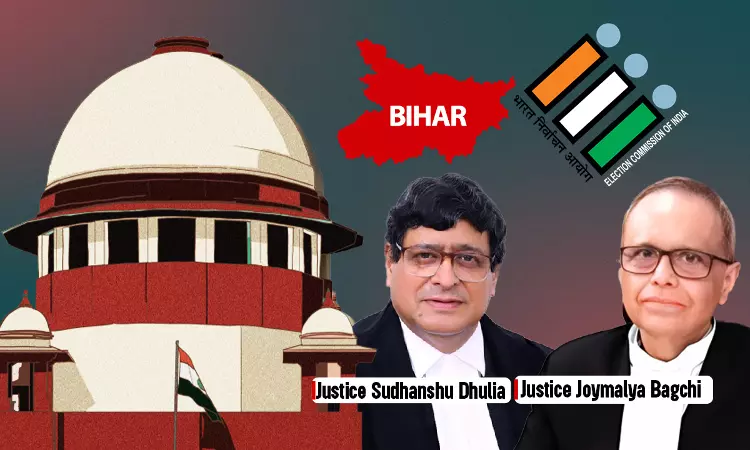- Home
- /
- Top Stories
- /
- Citizenship Determination Isn't...
Citizenship Determination Isn't Election Commission's Job; It's Home Ministry's, Says Supreme Court During Bihar SIR Hearing
Amisha Shrivastava
10 July 2025 6:25 PM IST
The Supreme Court on Thursday questioned the Election Commission of India (ECI) over its decision to conduct a Special Intensive Revision (SIR) of electoral rolls in Bihar months before the upcoming Assembly elections.The bench raised concerns about voters being asked to furnish documents at short notice and about the legal authority of the ECI to seek proof of citizenship.A bench of...
The Supreme Court on Thursday questioned the Election Commission of India (ECI) over its decision to conduct a Special Intensive Revision (SIR) of electoral rolls in Bihar months before the upcoming Assembly elections.
The bench raised concerns about voters being asked to furnish documents at short notice and about the legal authority of the ECI to seek proof of citizenship.
A bench of Justice Sudhanshu Dhulia and Justice Joymalya Bagchi was hearing a batch of petitions challenging the ECI's June 24 order initiating the SIR under Section 21(3) of the Representation of the People Act, 1950.
Senior Advocate Kapil Sibal, appearing for RJD MP Manoj Jha, contended that the ECI was shifting the burden of proving citizenship onto voters. “The burden is not on me to prove citizenship. Before they remove me from electoral roll, they have to show that they have some document in their possession that proves that I am not a citizen,” he said. He added that several commonly held documents like Aadhaar, MNREGA job card, EPIC card, and ration card were excluded from the ECI's list, making compliance difficult.
Justice Bagchi questioned the ECI's exclusion of Aadhaar, stating that even the documents included by ECI were not proof of citizenship by themselves. “Even these other documents by themselves don't prove citizenship.”
The bench also questioned whether the issue of citizenship even falls within the jurisdiction of the ECI. When Senior Advocate Rakesh Dwivedi for ECI submitted that Aadhaar could be used for identity verification but not as proof of citizenship, Justice Bagchi said, “That (citizenship determination) is a different issue and the prerogative of Home Ministry.”
However, Dwivedi responded that the ECI has role as the Representation of People Act, 1950 mandate that one must be a citizen to vote.
Justice Dhulia asked, “Isn't it too late now for that?” referring to the timing of the revision process so close to the scheduled elections in November. He pointed out that if voters had to file appeals just to remain on the list, they could lose their right to vote in the upcoming Assembly elections. “Your decision, let us say to disenfranchise the person who is already there on the electoral roll of 2025, would compel this individual to appeal against the decision and go through this entire rigmarole and thereby be denied of his right to vote in the ensuing election”, he said.
Justice Dhulia added, “They are saying that you are asking people for documents suddenly which they don't have.”
Senior Advocate Abhishek Manu Singhvi argued against linking such a large-scale exercise to the upcoming elections. “An exercise of such massive nature should be delinked with an impending election,” he said.
Justice Bagchi also questioned this, noting that it is possible that some are inadvertently missed from the draft and it may not be practical to correct all such omissions before the elections, “So there is a condition that even apart from name being in the previous electoral roll, the form also needs to be filled. What we are trying to understand is the exercise can inadvertently also and due to circumstances beyond control of an elector, create a situation of omission. Such omission can be corrected. Once someone raises on objection, there is a provision for oral hearing. Our question is, with such a vast population, is it possible to link such an exercise with an election?”
He also pointed out that even the census takes a year, questioning the practicality of ECI completing the SIR within a few months. “This timeline…why just 30 day? The census will take a year.”
Dwivedi, responded that the Commission was following proper procedure and that over 60% of forms, around five crore, had already been collected. He assured the Court that all eligible voters would be included and that hearings would be held in case of objections. “Let the revision exercise be completed. And then Your Lordships can look at the entire picture,” he submitted.
Dwivedi submitted that the Commission had no intention to remove any genuine voter. “Election Commission is one constitutional body which is in direct relationship with the elector. It cannot and does not have any intent whatsoever to exclude anybody from the voter list unless and until the hands of the Commission are compelled by the provision of law itself,” he said.
Justice Dhulia concluded the discussion with a caution, “We have serious doubt on whether you can follow this timeline. Remember, you have to follow the procedure. It is something that is not practical.”
Ultimately, the Court told the Election Commission of India to consider Aadhaar card, voter ID card and ration card also as acceptable documents for the Special Intensive Revision. The matter will be heard next on July 28, 2025.
Case no. – W.P.(C) No. 640/2025 and connected matters
Case Title – Association for Democratic Reforms and Ors. v. Election Commission of India and connected matters



